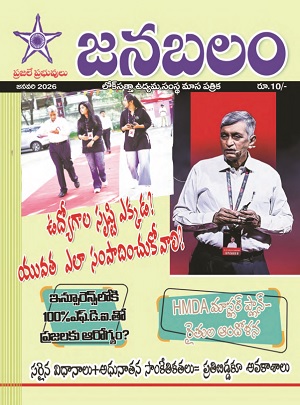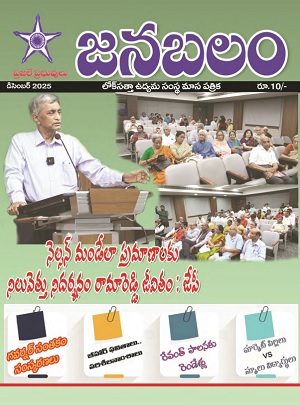Following is the text of a letter that Lok Satta Party President, Dr. Jayaprakash Narayan presented to the Prime Minister Dr. Manmohan Singh at Raj Bhavan, Hyderabad to night today (9th Oct) on “Flood Relief Assistance”
9th October 2009
Hyderabad
To
Dr. Manmohan Singh
The Prime Minister of India
Esteemed Prime Minster Dr Manmohan Singh ji,
We are grateful to you for the prompt assistance provided by the Government of India to Andhra Pradesh following the unprecedented flood in the Krishna River, last week. Your Government’s assistance has greatly aided the immediate relief and rehabilitation efforts of the AP State Government.
Now, we earnestly urge you to examine and act upon the following five critical issues, as a part of the Union Government’s long-term reconstruction and flood management assistance to Andhra Pradesh:
Resettlement of ‘lanka’ villages: The Krishna River’s lanka villages (situated on the river channels and close to the mouths of the river) are highly vulnerable to both riverine and coastal flooding. These villages should be relocated to suitable and safe locations nearby, to keep human settlements out of the flood path. As in the case of Godavari River’s lanka villages, agricultural activities could however be permitted to continue in these fertile but, low-lying and flood prone areas. The government’s Resettlement-and-Rehabilitation package for the State should fully and generously provide for the proper relocation of these lanka villages to safer areas.
Creation of a permanent ‘National Disaster Relief Force’ at multiple locations: The recurring heavy floods to the mighty Godavari and Krishna rivers in Andhra Pradesh have seen the governmental relief measures taking some time to reach the affected peoples and areas. Therefore a contingent of ‘National Disaster Relief Force’ needs to be created on a permanent basis to provide effective emergency relief. This rapid-response Force should be manned by adequate numbers of fully trained emergency relief personnel and must be provided with the necessary equipment including motor boats and human flotation devices along with emergency medical supplies and ready-to-eat emergency food rations. Units of this Force could operate out of bases in Vijayawada, Srisailam and Nagarjunasagar dams (all on the Krishna River) and Rajahmundry (on the Godavari River), to provide rapid emergency relief to flood-affected regions.
Flood-proofing the hydel power generation units: The long-term reconstruction package must provide for the flood-proofing of the hydroelectric power generation units on the right and left banks at Srisailam and Nagarjunasagar dams on Krishna River. This package must also provide for the strengthening of the hydel power distribution infrastructure. These steps would greatly contribute towards ensuring that hydel power generation and distribution are not adversely affected during major flood events.
Strengthening of the Krishna river bunds: Last week’s unprecedented flood of 25 lakh cusec-magnitude has severely exposed the structural limitations of the existing bunds on Krishna River (located downstream of the Prakasam Barrage at Vijayawada), which were designed and constructed to handle floods of less than 10-11 lakh cusecs. The bunds’ structure should be greatly strengthened so that they can handle floods of much higher magnitude, of around 25 lakh cusecs. This project must be taken up in a time-bound manner, and needs to be completed within two years.
Constitution of Expert Committees for flood mitigation and response to climate change:
The Krishna River, which usually sees chronic shortages of water leading to frequent water sharing disputes, has now witnessed a flood of unprecedented magnitude. Last week’s flood underscores the importance of a scientific and timely decision-making process on the manner of storage and sharing of river flows, anticipation of riverine floods and mitigating floods including advance depletion of reservoirs. We therefore urge the Government of India to constitute an Empowered Expert Committee to institutionalize permanent and verifiable measures for real-time monitoring of rainfall-runoff patterns and river water levels at critical points and thereby take appropriate and timely decisions to mitigate future floods. Such a Committee could consist of domain experts drawn from the Central Water Commission (CWC), other concerned public agencies and academia, experts in disaster management and public officials of Andhra Pradesh, Karnataka and Maharashtra.
Recent scientific evidence suggests a delay in the yearly onset of monsoonal rains, even as the intensity/severity of some individual rainfall events is increasing; the monsoon rainfall events too are perceived to have become more erratic and less consistent over the years. Any such long-term changes in the rainfall patterns would greatly impact Indian agriculture. Continental Europe has been experiencing advanced onset of its yearly spring and has undertaken a corresponding change in its agricultural practices.
Given the unique water-use needs and water management practices of Indian agriculture, we need to undertake a rigorous scientific study on the impact of any long-term change in the monsoonal rainfall patterns, drawing upon global expertise in this field. Therefore, we urge you to constitute an Expert Committee to study climate change patterns in India and recommend appropriate modifications to current water management and agricultural practices.
Undertaking the above measures would greatly help prevent or mitigate future floods and establish sustainable water management practices. We therefore urge your government to take all necessary steps at the earliest by charting a time-bound programme, to achieve the above objectives.
We have great faith in your leadership.
With personal warm regards,
Sincerely,
Jayaprakash Narayan
President





No comments:
Post a Comment